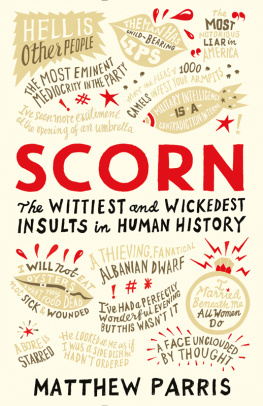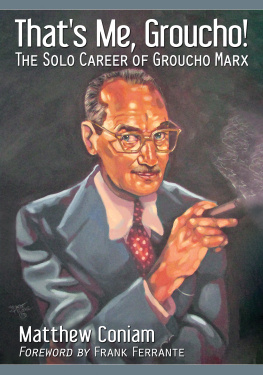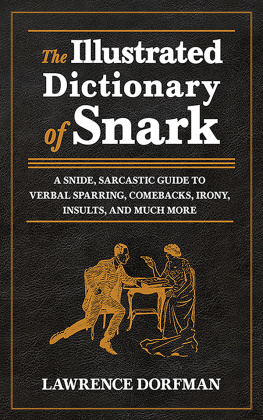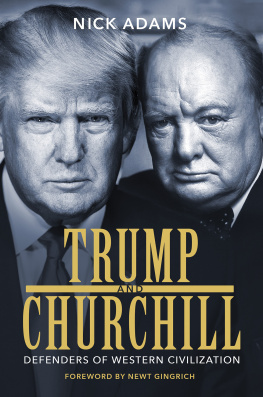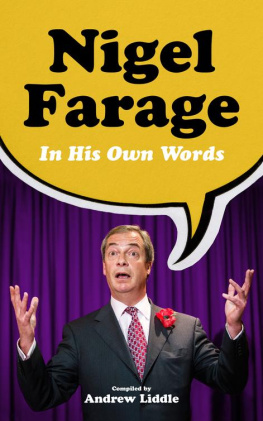SCORN
MATTHEW PARRIS worked for the Foreign Office before serving as an MP. He now writes as a columnist for The Times and the Spectator, and in 2011 won the Best Columnist award at the British Press Awards. He is the author of several books, including his autobiography Chance Witness and the bestselling The Spanish Ambassadors Suitcase.
SCORN
The WITTIEST and WICKEDEST INSULTS in HUMAN HISTORY
MATTHEW PARRIS

First published in Great Britain in 2016 by
PROFILE BOOKS LTD
3 Holford Yard
Bevin Way
London
WC1X 9HD
www.profilebooks.com
Copyright Matthew Parris, 2016
The moral right of the author has been asserted.
All rights reserved. Without limiting the rights under copyright reserved above, no part of this publication may be reproduced, stored or introduced into a retrieval system, or transmitted, in any form or by any means (electronic, mechanical, photocopying, recording or otherwise), without the prior written permission of both the copyright owner and the publisher of this book.
A CIP catalogue record for this book is available from the British Library.
eISBN 978 1 78283 297 3
Introduction
This is a new anthology. The original Scorn, first published in 1994, prospered, was expanded, occasionally updated, and over the years appeared in a series of editions under different imprints, the last published eight years ago.
It was time for a clearout and re-stock. My assistant Robbie Smith and I decided to remove all the entries which seemed to us to have lost freshness or currency, and replace them with new material: some of it classic, some modern, some (given a British referendum and an election year in America) very recent indeed. This time we had the social media to plunder too; and two more prime ministers and half a dozen more party leaders as richly scorned as those that went before. And we wanted to beef up the entries on sport, a cornucopia of verbal abuse which I had hitherto neglected.
But the concept and basic format of the book remain the same. This is a whimsical and quirky collection, not a comprehensive dictionary. Nor is it a roll-call of literary merit. Silvio Berlusconis view of Angela Merkel an unfuckable lard-arse is more lump-hammer than it is stiletto, and David Camerons alleged dalliance with a dead pigs head drew a rich harvest of unprintables for us to print. But Noel Gallagher has given us more blade than bludgeon in his estimation of his brother Liam (a man with a fork in a world of soup) and of Russell Brand (I couldnt see him overthrowing a table of drinks).
As before, we have not strung out the entries. Nor have we attempted to divide them into neat sections attacks on honour, attacks on appearance, attacks on ability, etc. or where would you put the remark that a mans an incompetent, warty scoundrel? Instead we have tried to order these quotations in a way that allows them to speak, one to another.
Scanning our chosen remarks, many struck us as voices answering, echoing or rebuking each other down the ages. Often there seemed to be a dialogue going on, sometimes between people who had never heard of each other, sometimes between people who had. So we have tried to arrange our quotations as a sort of conversation, a rally. Often not always this works well. Sometimes the thread linking the dialogue is tenuous. Occasionally it may break. Rallies are not continuous. More than once a new voice will take the ball and run with it to a different court. But the feelings and ideas which link human expressions of scorn have enough in common to bounce these quotations off each other in a verbal sport which, at least sometimes, finds meaning and momentum.
The direction of the conversation has been signposted, by topic, very broadly in the heading at the beginning of each chapter. But we hope that this dialogue of voices has enough shape to invite its being read as a play, rather than consulted as a directory.
A play or directory of what? There are many excellent anthologies of insult, which we have consulted freely, some of which are credited in the Acknowledgements. But they leave so much out. Insult is restrictive. Scorn became our chosen title, for language can be used to express anger, hatred or disapprobation in a range of ways, of which simple insult is only a part. When Job curses the day he was conceived, he scorns life itself, but this is not really an insult. When Hobbes describes human society as nasty, brutish, and short, that is scorn, not insult. Neither is witty. Neither are put-downs. Wit and put-down taking a verbal dig at others are part of scorn, but not the whole of it. What we have tried to explore has been the dark side of language: humorous or serious, the use of the spoken and written word to hurt, wound or ridicule to decry not just other persons but things too: and art, and life, and God himself.
The language of scorn, though vast, finds itself pursuing one or more of only four purposes. The first purpose is part factual, part polemical: the indictment the conveying of hurtful facts or a hurtful argument. The literature is enormous and a little outside our theme; it finds a handful of examples in this book, such as Burkes indictment of Warren Hastings and Geoffrey Howes of Margaret Thatcher.
The second is not to persuade or inform but to discomfort by a reference to existing, agreed knowledge: mockery words which allude to something already known or suspected but whose mention, precisely because it is known, is hurtful. It could be, for example, a reference to someones big nose or humble parentage, or a physical or moral defect, a failing.
A third purpose of scorn comprises the very simplest form of abuse: the nose-thumb or snarl. This is the use of language in circumstances where the alternative might be to spit, an expression of pure hatred: I loathe you or ya-boo-sucks. Such abuse conveys neither reason nor justification for the scorn; it conveys the scorn alone.
And finally the most curious of the four: the curse a verbal formula used to invoke some malign external power to hurt ones victim. This uses words as we might use a pin to stick in a voodoo doll.
It is fascinating to observe the decline in the potency and frequency of real cursing between ancient times and our own. God and the prophets do a great deal of it in the Old (and to some extent the New) Testament. Judaism and Islam use the curse. So did the ancient Egyptians we include here a desecrators curse. In early times, in primitive cultures now, and very strongly in Eastern European cultures today, the use of language to curse is rich and lively, while the use of wit, indictment and other verbal abuse is often disappointingly crude.
As faith in the supernatural declines, so does the living curse. It degenerates into a notional curse (damn you, a plague on both your houses) which neither alludes to any actual failing nor conveys real information. It takes the form of a curse but is not a true curse: it is just a snarl. Modern cursing, though common, is uninteresting and routine because its soul is dead. We have lost our link with the supernatural. Correspondingly, other forms of scorn have been getting cleverer and wittier since the ancients. Words, stripped of the innate magical powers invoked by the simple act of pronouncing them, are obliged to carry interest and meaning in their own right.
As we gathered material for this book it became clear that the curse is really a subject on its own, and needs an anthology of its own; it cannot be properly integrated into other forms of verbal abuse. But it is too interesting to ignore. We have therefore included, along with ancient, primitive and folk abuse, a short section in which a sampler of curses, from ancient to modern times is assembled more as a list than as a dialogue.
Next page
